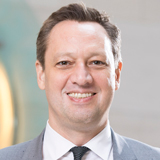
Tobias Adrian is the financial counsellor and director of the monetary and capital markets department at the International Monetary Fund (IMF). In this capacity, he leads the IMF’s work on financial sector surveillance, monetary and macroprudential policies, financial regulation, debt management, and capital markets. Adrian also oversees capacity building activities in the IMF member countries, particularly with regard to the supervision and regulation of financial systems, central banking, monetary and exchange rate regimes, and asset and liability management. His research interests center on asset pricing, financial institutions, monetary policy, and financial stability, with a particular focus on the macroeconomic consequences of developments in capital markets. Prior to joining the International Monetary Fund, Adrian was a senior vice president at the Federal Reserve Bank of New York, where he served as the associate director of the research and statistics group. While at the New York Fed, he contributed to monetary policy, financial stability policies, and crisis management. Adrian has taught at New York University and Princeton University. He received his abitur in literature and mathematics from Humboldschule Bad Homburg, a maîtrise from Dauphine University Paris, a diplom from Goethe University Frankfurt, an MSc from the London School of Economics, and a PhD from the Massachusetts Institute of Technology.

Malcolm Baker is the Robert G. Kirby Professor of Business Administration at the Harvard Business School (HBS); he is currently on leave for the 2018–2019 academic year. Baker’s research encompasses the fields of behavioral finance, corporate finance, and capital markets, with a primary focus on the interactions among corporate finance, investor behavior, and inefficiency in capital markets. His work has been awarded the 2002 Brattle Prize, given annually to the best corporate finance paper published in the Journal of Finance, the 2011 Sharpe Award, given annually by the Journal of Financial and Quantitative Analysis, second place for the 2012 Jensen Prize, given annually by the Journal of Financial Economics, and the 2011 and 2014 Graham and Dodd Scroll, given annually by the Financial Analysts Journal. Baker served as the HBS unit head for finance from 2014 through 2018, and from 2011 to 2018 he directed the corporate finance program at the National Bureau of Economic Research. He is currently the director of research at Acadian Asset Management and a board member at Triton International. Before beginning his doctoral studies, Baker was a senior associate at Charles River Associates and a member of the 1992 US Olympic rowing team. He earned a BA in applied mathematics-economics from Brown University, an MPhil in finance from Cambridge University, and a PhD in business economics from Harvard University.

Laurence M. Ball is a full professor of economics at Johns Hopkins University, and is currently serving as the chair of the economics department, which he joined in 1994. Ball studies unemployment, inflation, and fiscal and monetary policy. He is also a research associate at the National Bureau of Economic Research and a consultant for the International Monetary Fund. From 1989 to 1994 Ball was an assistant professor of economics at Princeton University; prior to that position, from 1985 to 1989 he served as an assistant professor of economics at New York University’s Graduate School of Business. Ball has been a visiting scholar at a number of central banks, including the Federal Reserve, the Bank of England, the Bank of Japan, Norges Bank, the Reserve Bank of Australia, the Reserve Bank of New Zealand, and the Hong Kong Monetary Authority. He is the author of the recent book, The Fed and Lehman Brothers: Setting the Record Straight on a Financial Disaster. Ball earned a BA in economics from Amherst College and a PhD in economics from the Massachusetts Institute of Technology.

Antje Berndt is the head of the finance department at Australian National University’s Research School of Finance, Actuarial Studies, and Statistics. Her research concentrates on the theoretical and empirical analysis of different sources of delinquency risk: corporate credit risk, fiscal risk, and mortgage default risk. Berndt is an ANU Futures Scheme scholar and was the recipient of the PNC Professorship in Computational Finance, the GARP Research Management Award, the Fulbright Enterprise Scholarship, the Moody's Research Award, and funding from the National Science Foundation and the National Security Agency. Prior to joining Australian National University in 2016, Berndt held academic appointments at North Carolina State University (2013–2016), Carnegie Mellon University (2005–2013), and Cornell University (2003–2005). Besides her scholarly publications, Berndt’s work has been featured in the Wall Street Journal, Bloomberg, and Reuters, and also on CNBC’s “Squawk Box” and on NPR’s “Marketplace.” Born and raised in Germany, she earned undergraduate and master’s degrees in economics and mathematics at the University of Kiel, an MA in finance at Columbia University, and a PhD in statistics from Stanford University.

Olivier Blanchard joined the Peterson Institute for International Economics in October 2015, where he is the inaugural C. Fred Bergsten Senior Fellow. Blanchard is also the Robert M. Solow Professor of Economics emeritus at the Massachusetts Institute of Technology (MIT). A citizen of France, he is a macroeconomist who has spent his professional life in the United States. Blanchard has worked on a wide range of issues, including the role of monetary policy, the forces behind the recent global economic crisis, the nature of speculative bubbles, the labor market, and the determinants of unemployment. He is the author of many articles and books, including two macroeconomics textbooks, one at the graduate level and one at the undergraduate level. Blanchard is a fellow and past council member of the Econometric Society, a member of the American Academy of Sciences, and the current president of the American Economic Association. In 1977 Blanchard began his teaching career at Harvard University, then in 1982 joined the MIT economics department, which he chaired from 1998 to 2003. In 2008 he took a leave of absence to be the economic counsellor and director of the research department at the International Monetary Fund. Blanchard has an MS in economics from the University of Paris-Nanterre and a PhD in economics from MIT.

Claudio Borio has served as the head of the monetary and economic department at the Bank for International Settlements (BIS) since November 2013, and is a member of the BIS’s executive committee. Borio studies monetary policy, banking, finance, and issues related to financial stability, and has an extensive publication record in these areas. Since joining the BIS in 1987, Borio’s responsibilities have included serving as the director of research and statistics, as head of the secretariat of the Committee on the Global Financial System, and as head of the Gold and Foreign Exchange Committee (now the Markets Committee) which examine, inter alia, issues related to financial stability and market functioning. From 1985 to 1987, Borio was an economist at the Organisation for Economic Development and Co-operation (OECD) in the country studies branch of the economic and statistics department. Prior to working at the OECD, Borio was a lecturer and a research fellow at Brasenose College, Oxford University. He has a BA in politics, philosophy, and economics, an MPhil, and a DPhil in economics, all earned at Oxford University.

Gabriel Chodorow-Reich is an assistant professor of economics at Harvard University, a post he assumed in 2014, and a faculty research fellow at the National Bureau of Economic Research. His work focuses on macroeconomics, finance, and labor markets. Chodorow-Reich was among the five recipients of the 2013 AQR Top Finance Graduate Award, administered in conjunction with the Copenhagen Business School. His coauthored paper, “Does State Fiscal Relief During Recessions Increase Employment? Evidence from the American Recovery and Reinvestment Act,” received the 2013 Economic Policy Best Paper Prize from the American Economic Journal. Chodorow-Reich is currently a visiting scholar in the research department at the Federal Reserve Bank of Boston. He has held visiting positions at Princeton University’s Woodrow Wilson School of Public and International Affairs and at the Massachusetts Institute of Technology. From 2009 through 2010, Chodorow-Reich served as an economist on the Council of Economic Advisers. He has an AB in social studies from Harvard University and received his PhD in economics from the University of California at Berkeley.

Piti Disyatat is the executive director of the Puey Ungphakorn Institute for Economic Research, founded by the Bank of Thailand as a quasi-independent institution to provide a centralized platform for fostering and disseminating high-quality economic research to inform policymaking. Disyatat’s own work concentrates on monetary economics, banking, and international finance. Prior to his current position, Disyatat had responsibilities in various areas of the Bank of Thailand, including financial risk management, foreign reserve management, and monetary operations. Before joining the Bank in 2001, Disyatat spent two years as an economist at the International Monetary Fund. From 2007–2010, he served as a senior economist in the monetary and economic department at the Bank for International Settlements. Disyatat was awarded the Puey Ungphakorn Golden Medal Award for Best Young Economist in 2011. He has also served as an adjunct faculty member for the economics departments at Chulalongkorn University and Thammasat University in Thailand. Disyatat has a bachelor of economics (First Class Honours) from the Australian National University and earned a PhD in economics from Princeton University.

Roger W. Ferguson, Jr., is the president and chief executive officer of TIAA. Before joining TIAA in 2008, Ferguson was the head of financial services for Swiss Re, chairman of Swiss Re America Holding Corporation, and a member of the firm’s executive committee. From 1999 to 2006, Ferguson served as the Vice Chairman of the Board of Governors for the Federal Reserve System, represented the Federal Reserve on several international policy groups, and served on key Federal Reserve System committees, including Payment System Oversight, Reserve Bank Operations, and Supervision and Regulation. As the only Governor in Washington, DC on 9/11, Ferguson led the Fed’s initial response to the terrorist attacks. Before his appointment to the Board of Governors in 1997, Ferguson was an associate and then a partner at McKinsey and Company from 1984 to 1997. He began his career as an attorney in the New York City office of Davis Polk & Wardwell. Ferguson chairs the Conference Board and serves on the boards of the Institute for Advanced Study, the Memorial Sloan Kettering Cancer Center, the Smithsonian Institution’s Board of Regents, and the New York State Insurance Advisory Board. Ferguson is a fellow of the American Philosophical Society and of American Academy of Arts & Sciences, where he cochairs its Commission on the Future of Undergraduate Education. He served on President Obama’s Council on Jobs and Competitiveness and cochaired the National Academy of Science’s Committee on the Long-Run Macro-Economic Effects of the Aging US Population. Ferguson has an AB in economics, a JD, and a PhD in economics, all from Harvard University.

José L. Fillat is a senior economist and policy advisor in the research department at the Federal Reserve Bank of Boston. He studies the linkages between international trade and finance and also works on topics related to banking, housing, and asset pricing. Some of his recent work involves portfolio allocation decisions in the presence of housing and also the role of global banks in the international transmission of shocks. Fillat joined the Boston Fed in 2008 as an economist working with the bank supervision department, where he contributed to the implementation of the Basel II advanced approaches throughout the Federal Reserve System. He also served on a System-wide committee overseeing the development of models for the stress testing mandated by the Dodd-Frank Act. In 2017 Fillat transferred to the research department. He teaches in the applied economics graduate program at the Woods College of Advancing Studies (WCAS) at Boston College, where he also serves on the advisory board for the MS in applied economics at WCAS. Fillat has also taught economics at Harvard University. He earned a BA and an MSc in economics from the Universitat Pompeu Fabra (Barcelona) and a PhD in economics from the University of Chicago.

Kristin J. Forbes is the Jerome and Dorothy Lemelson Professor of Management and Global Economics at the Sloan School of Management. Her research addresses policy-related questions in international macroeconomics and finance, with recent work on topics such as exchange rate pass-through, capital flows, macroprudential regulation, financial crises, contagion, capital controls, current account imbalances, and inflation dynamics. Forbes joined the Massachusetts Institute of Technology in 1998, but she has regularly rotated between academia and senior policy positions. She was an external member of the Bank of England’s Monetary Policy Committee (2014–2017), a member of the White House’s Council of Economic Advisers (2003–2005), and was a deputy assistant secretary of the US Treasury Department (2001–2002). Forbes is a research associate at the Centre for Economic Policy Research and the National Bureau of Economic Research, and is a member of the Bellagio Group and the Council on Foreign Relations. In 2014, the IMF’s quarterly magazine, Finance & Development, named Forbes as one of the 25 economists under the age of 45 who “will have the most influence in the coming decades on our understanding of the global economy.” Prior to graduate school, Forbes worked at the World Bank and at Morgan Stanley. She has a BA in economics from Williams College, and received her PhD in economics from the Massachusetts Institute of Technology.

Benjamin M. Friedman is the William Joseph Maier Professor of Political Economy at Harvard University, and a former chair of its economics department. He has written extensively on economic policy, particularly on the role that financial markets play in shaping how monetary and fiscal policies affect overall economic activity. Friedman’s academic work has specifically addressed the effects of government deficits and surpluses on interest rates, exchange rates, and business investment; appropriate guidelines for the conduct of US monetary policy; and appropriate policy actions in response to crises in a country’s banking or financial system. He has written two books aimed at a broader audience, Day of Reckoning: The Consequences of American Economic Policy Under Reagan and After (1988), which received Columbia University’s George S. Eccles Prize, an annual award for excellence in writing about economics, and The Moral Consequences of Economic Growth (2005). Friedman is a research associate at the National Bureau of Economic Research, where he previously served as the director of its program on financial markets and monetary economics. He is also a member of the Council on Foreign Relations and the American Academy of Arts and Sciences. Friedman received an AB, AM, and PhD degrees in economics from Harvard University, and holds an MSc in economics and politics from King’s College, Cambridge, where he studied as a Marshall Scholar.

Jeffrey C. Fuhrer is an executive vice president at the Federal Reserve Bank of Boston, where he also serves as a senior monetary policy advisor and is responsible for the Bank’s regional and community outreach functions. He has been an associate economist of the Federal Open Market Committee and regularly attends this key US policymaking meeting with the Bank’s president. Fuhrer has published numerous scholarly papers on the interactions between monetary policy, inflation, consumer spending, and asset prices, and regularly participates in meetings of the Federal Open Market Committee. He joined the Bank’s research department in June 1992 as an assistant vice president and economist, and from 1995–2001 headed its open economy macro/international section. In 2000 Fuhrer was named senior vice president and monetary policy advisor, and in 2006 he was named executive vice president. He directed the Bank’s research department from 2001 through 2010. Fuhrer began his career at the Board of Governors of the Federal Reserve System, first as a research assistant, and then in 1985 returned as a senior economist after completing his doctorate. He earned an AB in economics with highest honors from Princeton University and an MA and a PhD in economics from Harvard University.

Robin Greenwood is the George Gund Professor of Finance and Banking at Harvard Business School (HBS), where he is the faculty chair of the Behavioral Finance and Financial Stability project, serves as the cochair of the business economics PhD program, and heads the finance unit. Greenwood has taught in both years of the HBS’s MBA curriculum as well as in its PhD program. His scholarship concentrates on behavioral and institutional finance, with a particular focus on “macro-level” market inefficiencies such as asset price bubbles. Greenwood has also coauthored research on the role that government and central banks play in the debt markets. His academic work has been recognized by research awards that include the 2015 Brattle Group Distinguished Paper for an outstanding corporate finance paper published in the Journal of Finance, as well as the inaugural 2014 Jack Treynor Prize given by the Institute for Quantitative Research in Finance. Greenwood is a research associate at the National Bureau of Economic Research and is member of the Federal Reserve Bank of New York’s Financial Advisory Roundtable. He earned SB degrees in economics and mathematics from the Massachusetts Institute of Technology and received a PhD in economics from Harvard University.

Philipp Hartmann is the Deputy Director General of the research department at the European Central Bank (ECB), and also coordinates its work on financial integration. He studies a wide range of issues in financial, monetary, and international affairs, has published numerous articles in academic and market journals, and has authored or coedited several books. Hartmann’s policy work has appeared in many official reports and been discussed in forums including the ECOFIN Council, the ECB Governing and General Councils, the Basel Committee on Banking Supervision, and the United Nations Economic Commission for Europe. Before coming to the ECB, Hartmann worked at the European Monetary Institute, the London School of Economics, was a part-time chaired professor at Erasmus University, from 2006 to 2011 was the vice president of SUERF (the European Monetary Monetary and Financial Forum), and was member of the Basel Committee Research Task Force. Hartmann is a fellow of the Centre for Economic Policy Research and a member of the scientific committee of the Fondation Banque de France. He has a diplom degree in economics from Universität Mannheim (Germany), an MA in economics from Université Catholique de Louvain (Belgium), and a doctorate in economics from DELTA (ENS-EHESS-CNRS, Paris), earned in the European Doctoral Program in Quantitative Economics.

Jan Hatzius is the chief economist at Goldman Sachs, and also heads the firm’s Global Economics and Markets Research. He is a member of the Global Investment Research Client and Business Standards Committee. In 1997 Hatzius joined Goldman Sachs in its Frankfurt office, and then transferred to the New York office in 1999. He was named a managing director in 2004 and a partner in 2008. Hatzius has won numerous forecasting prizes and is a rare two-time winner of the Lawrence R. Klein Award, given by Blue Chip Economic Indicators for the most accurate US economic forecast over the prior four years. His first Klein Award, in 2009, recognized that “Hatzius anticipated the turning points for key indicators [for the years 2005 to 2008] with more accuracy than any other leading forecaster.” His second win in 2011, for tracking the years from 2007 to 2010, cited his ability “to sort through all the static and deliver an extraordinarily accurate forecast of the recession and recovery.” Hatzius is a member of the economic advisory panels of the Congressional Budget Office and the Federal Reserve Bank of New York. Prior to joining Goldman Sachs, Hatzius was a research officer at the London School of Economics. He has earned degrees from the University of Wisconsin at Madison, the Kiel Institute for the World Economy, and a doctorate in economics from Oxford University.

Jean Helwege is a full professor of finance in the business school at the University of California, Riverside, which she joined in 2015. Her research interests include corporate bonds, empirical corporate finance, and financial institutions. From 2000 to 2015, Helwege held the J. Henry Fellers Professorship of Business Administration at the University of South Carolina. She has also been a professor at Ohio State University (1998–2004), the University of Arizona (2004–2006), and Pennsylvania State University (2006–2009). Before beginning her academic career, Helwege worked in the Federal Reserve System, first as an economist at the Board of Governors from 1988 to 1994, then as a senior economist at the Federal Reserve Bank of New York from 1994 to 1998. In 2017 she was a visiting scholar at Australian National University and at the Securities and Exchange Commission. Helwege recently served as the president of the Midwest Finance Association (MFA) and is the coeditor of the MFA’s official publication, the Quarterly Journal of Finance. She has a BA in linguistics from the University of Chicago, and earned her MA and PhD in economics from the University of California, Los Angeles.

Takatoshi Ito is a professor in the School of International and Public Affairs at Columbia University, where he directs the program on public pension and sovereign funds at the Center on Japanese Economy and Business. His research focus is on capital flows and currency crises, microstructures of foreign exchange rates, and inflation targeting. Before joining Columbia in 2014, Ito taught from 2004 to 2014 at the Graduate School of Economics at the University of Tokyo. He began his academic career at the University of Minnesota, where he taught from 1979 to 1988 before joining Hitotsubashi University, where he taught from 1988 to 2002. Other appointments have included visiting professorships at Columbia University, Harvard University, and Stanford University. Ito has also been a senior advisor in the research department at the International Monetary Fund (1994 to 1997), served as the Deputy Vice Minister for International Affairs at Japan’s Ministry of Finance (1999 to 2001), and was a member of the Prime Minister’s Council on Economic and Fiscal Policy (2006 to 2008). He is a research associate at the National Bureau of Economic Research, a fellow of the Econometric Society, a faculty fellow at the Centre for Economic Policy Research, and in 2004 served as the president of the Japanese Economic Association. Ito earned a BA and an MA in economics from Hitotsubashi University and an MA and a PhD in economics from Harvard University.

Victoria Ivashina is the Lovett-Learned Chaired Professor of Finance at the Harvard Business School (HBS), which she joined in 2006. Ivashina is the co-head of the HBS’s Private Capital Project and the HBS’s executive education program on private equity and venture capital. Her research includes topics on credit availability and pricing, corporate distress, global banking operations, the evolution of the leveraged loan market, asset allocation by pension funds and insurance companies, and value creation by private equity investors. Ivashina, along with her co-authors Benjamin Iverson and David C. Smith, won the 2017 Second Place Jensen Prize for the best paper published in the Journal of Financial Economics. She has also received the Harvard Business School’s Hellman Family Fellowship and the Berol Fellowship awards for research excellence. Ivashina is a research associate at the National Bureau of Economic Research, a research fellow at the Centre for Economic Policy Research, and a visiting scholar at the Federal Reserve Bank of Boston and the European Central Bank. She holds a BA in economics from Pontificia Universidad Católica del Perú and a PhD in finance from New York University’s Stern School of Business.

Josh Lerner is the Jacob H. Schiff Professor of Investment Banking at the Harvard Business School, where he also chairs the unit in entrepreneurial management. Much of Lerner’s research focuses on venture capital and private equity organizations. (This work is collected in three books, The Venture Capital Cycle, The Money of Invention, and Boulevard of Broken Dreams.) He also examines policies on innovation and how these impact firm strategies. (This research is discussed in three books, Innovation and Its Discontents, The Comingled Code, and The Architecture of Innovation.) Lerner is the codirector of the productivity, innovation, and entrepreneurship program at the National Bureau of Economic Research, and serves as the coeditor of its publication, Innovation Policy and the Economy. Lerner founded and runs the Private Capital Research Institute, a nonprofit organization that encourages access to data and research. He is a frequent leader of and participant in projects and events sponsored by the World Economic Forum. Lerner has received the Swedish government’s Global Entrepreneurship Research Award and the Cheng Siwei Award for Venture Capital Research. Before going to graduate school, Lerner spent several years at the Brookings Institution, where he worked on issues concerning technological innovation and public policy. He graduated from Yale College with a special divisional major, and earned a PhD in economics from Harvard University.

Chen Lian is completing his doctoral thesis in economics at the Massachusetts Institute of Technology. His two primary fields of concentration are macroeconomics and behavioral economics, while his secondary fields are economic theory and finance. Lian, with coauthor George Angeletos, wrote the chapter, “Incomplete Information in Macroeconomics: Accommodating Frictions in Coordination,” for volume 2 of the Handbook of Macroeconomics, and “Forward Guidance without Common Knowledge,” a forthcoming article in the American Economic Review. Together with Yueran Ma and Carmen Wang, Lian has coauthored a forthcoming article in the Review of Financial Studies, “Low Interest Rates and Risk Taking: Evidence from Individual Investment Decisions.” During his work toward a PhD in economics, Lian was an MIT Presidential Fellow in his first year of graduate studies and was a George K. Palm Fellow during his second year. Lian earned a BS in economics and a BS in mathematics from the Massachusetts Institute of Technology.

Yueran Ma is an assistant professor of finance at the University of Chicago’s Booth School of Business, which she joined in July 2018. Her main research interest is empirical studies conducted at the intersection of finance and macroeconomics. Her work covers topics including low interest rates and financial markets, the macroeconomic implications of debt contracts, nonfinancial firms and financial frictions, and expectations in finance and macroeconomics. Ma’s research often draws on insights from behavioral economics, and applies new approaches such as simple randomized experiments. She has also worked on questions in real estate and urban economics. Ma is a double recipient of the Cubist Systematic Strategies PhD Candidate Award for Outstanding Research, given at the 2016 and the 2017 Western Finance Association Annual Meeting. In 2017, she was one of the two recipients of the Harvard Business School’s Martin Award for Excellence in Doctoral Student Research in Business Economics, given for her work using randomized experiments and historical data on household investment allocations to show that individuals reach for yield and have a greater appetite for risk when interest rates are low. These findings offer new perspectives for understanding reaching-for-yield behavior and have been used by European regulators to inform their supervisory analyses. Ma earned a BA summa cum laude in applied mathematics from Harvard College and a PhD in business economics from Harvard University.

Loretta J. Mester is the president and chief executive officer of the Federal Reserve Bank of Cleveland. Her areas of expertise include the organizational structure and productive efficiency of financial institutions, financial intermediation and regulation, agency problems in credit markets, credit card pricing, central bank governance, and inflation. Prior to joining the Cleveland Fed in June 2014, Mester was an executive vice president and the director of research at the Federal Reserve Bank of Philadelphia, where she also oversaw the professionals in the financial statistics department and the Payments Card Center. She joined the Philadelphia Fed as an economist in 1985, became a senior vice president and director of research in 2000, and an executive vice president in 2010. Mester is an adjunct professor of finance at the University of Pennsylvania’s Wharton School and a fellow at the Wharton Financial Institutions Center. She is a founding director of the Financial Intermediation Research Society, a member of the advisory board of the Financial Intermediation Network of European Studies (FINEST), a director of the Council of Economic Education, a director of Greater Cleveland Partnership, and a trustee of the Cleveland Clinic and of the Cleveland Orchestra. Mester graduated summa cum laude with a BA in mathematics and economics from Barnard College of Columbia University and earned MA and PhD degrees in economics from Princeton University, where she was a National Science Foundation Fellow.

Joe Peek is a vice president and economist at the Federal Reserve Bank of Boston, where he heads the research department’s finance section. His current research interests are in financial stability, international banking, Japanese banking problems, macroprudential regulation, and monetary policy. Peek is also a research associate at Columbia University’s Center on the Japanese Economy and Business. In 2004–2005 he was a fellow with the Center for Financial Research at the Federal Deposit Insurance Corporation. Before joining the Boston Fed in 2012, Peek held the Gatton Chair in International Banking and Financial Economics at the University of Kentucky’s Gatton College of Business and Economics from 2000 through 2011. He taught in the department of economics at Boston College from 1978 to 2000, where he progressed from an instructorship in 1978 to a full professorship by 1989, and served as director of graduate studies from 1987 to 1990. From 1985 through 2000, Peek was a visiting scholar at the Boston Fed. In Spring 1992 and Spring 1994, Peek served in a visiting capacity at the University of Canterbury in Christchurch, New Zealand. He earned a BS in mathematics and an MS in economics from Oklahoma State University, and a PhD in economics from Northwestern University.

Eric S. Rosengren is the president and chief executive officer of the Federal Reserve Bank of Boston, a post he assumed in July 2007. His research studies the link between financial problems and the real economy, and he has published extensively on macroeconomics, international banking, bank supervision, and risk management. Prior to his current position, Rosengren was a senior manager in the research department and in the division of bank supervision, regulation, and credit. He joined the Boston Fed in 1985 as an economist in the research department, was promoted to assistant vice president in 1989 and to vice president in 1991, when he also became head of the department’s banking and monetary policy section. In 2000 Rosengren was named senior vice president and head of the department of supervision, regulation, and credit, in 2003 was given the additional title of chief discount officer, and in 2005 became an executive vice president. While in the bank supervision function, Rosengren was active in domestic and international regulatory policy. He is a director of the United Way of Massachusetts Bay and Merrimack Valley, the chair of Colby College’s Board of Trustees, and a member of the University of Wisconsin’s Economics Advisory Board. Rosengren earned a BA in economics from Colby College, and an MS and a PhD in economics from the University of Wisconsin at Madison.

Phurichai Rungcharoenkitkul is a senior economist in the monetary and economic department at the Bank for International Settlements (BIS), which he joined in late 2014. His research interests are in monetary economics and monetary policy, with recent work focusing on financial stability and on the monetary policy framework. Prior to joining the BIS, Rungcharoenkitkul was at the Bank of Thailand, where from January 2013 through November 2014 he headed the monetary policy strategy team that is responsible for formulating recommendations and providing analytical support to the central bank’s monetary policy committee. From March 2011 through December 2012, Rungcharoenkitkul was an economist at the International Monetary Fund, where he worked in the analytical division of the Asia & Pacific Department and was a mission team member for Cambodia and Malaysia. From January 2006 to March 2011, Rungcharoenkitkul was a senior economist at the Bank of Thailand, where his various duties included forecasting/modeling, macroeconomic analysis, and reserve management. He earned a BSc in economics and statistics from the University of Bristol, where he graduated at the top of his class, and then went on to earn an MPhil and a DPhil in economics from Oxford University.

Joanna Stavins is a senior economist and policy advisor in the research department at the Federal Reserve Bank of Boston, which she joined in 1995. Stavins specializes in understanding how and why consumers make payment decisions, as well as many other aspects of consumer behavior. She has analyzed the costs of alternative payment instruments, the demand for different payment instruments, and has estimated the social costs and benefits associated with various payment methods. Stavins has also conducted econometric analyses of pricing and market structure in several industries, including airlines and personal computers. She has worked on payment-related policy initiatives within the Federal Reserve System and has served as an economic advisor to payments groups within and outside the Federal Reserve. Before coming to work at the Boston Fed, Stavins was a senior analyst at the National Bureau of Economic Research. She has a BA in economics from Harvard University, an MA in economics from Tufts University, and an MA and a PhD in economics from Harvard University.

Lawrence H. Summers is the President Emeritus of Harvard University, where he currently serves as the Charles W. Eliot University Professor and as the Weil Director of the Mossavar-Rahmani Center for Business and Government at the John F. Kennedy School of Government. In 1983 Summers became one of the youngest individuals in recent history to be named as a tenured member of the Harvard University faculty. In 1987 he was the first social scientist to receive the National Science Foundation’s annual Alan T. Waterman Award, and in 1993 he was awarded the John Bates Clark Medal, given every two years to the outstanding American economist under the age of 40. Summers has published more than 150 articles in scholarly journals. He has played a key role in addressing every major financial crisis that has occurred over the last two decades while holding a series of senior policy positions. These include serving as the World Bank’s chief economist and vice president of development economics from 1991 to 1993, successive posts at the US Department of the Treasury from 1993 to 2001, including as the 71st US Secretary of the Treasury from 1999 to 2001, and as director of the National Economic Council from 2008 to 2010. Summers received an SB from the Massachusetts Institute of Technology and a PhD in economics from Harvard University.

Geoffrey M.B. Tootell is an executive vice president at the Federal Reserve Bank of Boston, and the director of the Bank’s research department. In that capacity, he oversees the department’s work, particularly the economic analysis it produces for the monetary policy deliberations conducted by President Rosengren and the Bank’s Board of Directors. Tootell’s own monetary policy research places a special emphasis on the determinants of inflation and on how the FOMC arrives at its decisions. He has explored the role that asset prices might play in policymaking and whether the Federal Reserve’s economic forecasts might be improved by incorporating bank supervisory information. Tootell’s broader research interests encompass macroeconomics, international economics, and political economy. He has written and co-authored a number of influential articles on racial patterns in mortgage lending. In 1989 Tootell joined the Bank as an economist, was promoted to assistant vice president and economist in 1993, and to vice president in 1998. In 2008 he was promoted to senior vice president and deputy director of research before becoming the research director in January 2011; in January 2017 he was promoted to executive vice president. Tootell has an AB from Harvard College, where he was a John Harvard Scholar, and earned his PhD in economics from Harvard University.

Elizabeth A. Ward is the executive vice president, chief financial officer, and chief actuary of Massachusetts Mutual Life Insurance Company (MassMutual), a leading mutual life insurance company with $780 billion in assets under management as of March 2018. A member of MassMutual’s Executive Leadership Team, Ward currently leads the company’s financial organization, which encompasses treasury, financial planning and analysis; financial reporting, including valuation and corporate tax, corporate inforce management; and procurement. In addition, she also has responsibility for MassMutual’s strategy and corporate development areas. Before Ward assumed the role of chief financial officer in June 2016, she held the role of chief enterprise risk officer, leading the enterprise risk management and actuarial division across all of the firm’s insurance and asset management companies. Prior to joining Babson Capital Management in 2001, a MassMutual affiliate, Ward worked in insurance company portfolio management at American Skandia, Charter Oak Capital Management, and Aeltus Investment Management, and in various areas of Aetna Life & Casualty. Ward is a member of the American Academy of Actuaries, a fellow of the Society of Actuaries, and has been certified as a Professional Risk Manager by the Professional Risk Managers’ International Association. She has a BA in economics and Spanish from the University of Rochester.